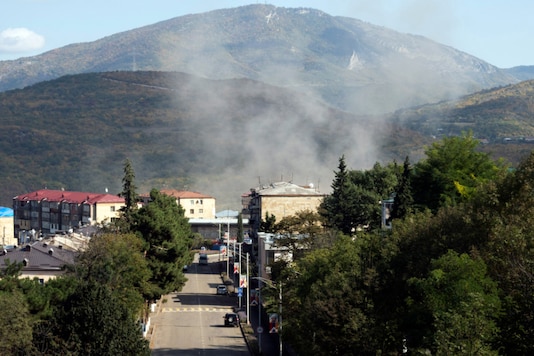Chris Ferguson is not going to fly on Starliner next year
By Loren Grush@lorengrush Oct 7, 2020
/cdn.vox-cdn.com/uploads/chorus_image/image/67595486/43931924191_68d5e19602_o.0.jpg)
Boeing employee and former NASA astronaut Christopher Ferguson will no longer command the first crewed test flight of Boeing’s new passenger spacecraft, the CST-100 Starliner, slated to carry its first human passengers next year. NASA astronaut Barry “Butch” Wilmore will take Ferguson’s place on the flight, riding along with the two other NASA astronauts already assigned to the mission.
In a video posted to Twitter, Ferguson said leaving the flight was a “difficult and personal decision” he had to make. “Next year is very important for my family,” he said in the video. “I have made several commitments which I simply cannot risk missing. I’m not going anywhere. I’m just not going into space next year.”
“I HAVE MADE SEVERAL COMMITMENTS WHICH I SIMPLY CANNOT RISK MISSING.”
Ferguson has been instrumental in the multiyear development of Boeing’s Starliner, a privately built crew capsule designed to ferry astronauts to and from the International Space Station for NASA. Ferguson commanded the last flight of NASA’s Space Shuttle in 2011, before retiring from the agency that year. He then joined Boeing and became director of crew and mission systems for the Starliner program. In 2018, Ferguson was assigned as commander of the first crewed flight test of Starliner, along with astronauts Nicole Mann and Mike Fincke who would be joining as crewmates. Since he is technically no longer a NASA astronaut, Ferguson would have become the first private citizen to fly on a privately made spacecraft to orbit.
I’m taking on a new mission, one that keeps my feet planted here firmly on Earth and prioritizes my most important crew – my family. I’ll still be working hard with the #Starliner team and the @NASA_Astronauts on our crew. pic.twitter.com/PgdhPqwYQS— Christopher Ferguson (@Astro_Ferg) October 7, 2020
NASA and Boeing had planned for Starliner’s first crewed flight to happen as soon as this year, but the flight has been significantly delayed due to problems with the program. In December 2019, Boeing launched the Starliner on its debut flight to the space station — with no crew on board — but the mission suffered from numerous software glitches that prompted the company to bring the capsule home early before it could reach the ISS. After a lengthy investigation by NASA, Boeing has been trying to implement a list of 80 recommendations to ensure that no more glitches occur on upcoming flights. And the company is gearing up to perform a second uncrewed test flight of Starliner, currently planned for December.
WILMORE WILL NOW START TRAINING IMMEDIATELY WITH MANN AND FINCKE
Now, Boeing is targeting no earlier than June of next year for the first crewed test flight, and Ferguson indicated to The Washington Post that he had a family wedding and other commitments in 2021. With Ferguson stepping down, Wilmore will now start training immediately with Mann and Fincke. Wilmore was already part of the backup crew for the mission, so he had already been training for the flight in case he needed to be slotted in. “Having had the chance to train alongside and view this outstanding crew as backup has been instrumental in my preparation to assume this position,” Wilmore said in a statement. “Stepping down was a difficult decision for Chris, but with his leadership and assistance to this point, this crew is positioned for success.”
In the meantime, Ferguson will still be very involved with Starliner. He is assuming a new role as director of mission integration and operations, where he will support the astronauts and make sure that their training is adequate, according to Boeing. The company notes that Ferguson will also be one of the last people the crew will see before they leave for space — and one of the first they’ll see when they return.

By Mike Wehner @MikeWehner
October 9th, 2020
Boeing’s Starliner crew shakeup gets a little more clear as we learn one of the reasons why commander Chris Ferguson stepped down.
The astronaut had family commitments in 2021, including his daughter’s wedding.
The mission has been delayed so many times, and the coronavirus caused so many issues, that things lined up poorly for the astronaut.
It was a few days ago that astronaut Chris Ferguson announced he would be stepping down from his position as the commander of the first Boeing Starliner crewed test flight in 2021. That’s a big deal, as Starliner has been repeatedly delayed and any further hiccups just serve to put the company even farther behind its rival SpaceX, which has already delivered on its promise to NASA with Crew Dragon.
At the time, Ferguson’s statement was relatively vague. He noted that he had prior commitments that he just couldn’t ignore. Now, there are lots of things that a person makes commitments for, but there aren’t many that couldn’t be canceled for a trip to space. Thanks to a statement from Boeing, now we know what is keeping Ferguson’s feet firmly planted on the ground.
According to a company statement, at least one of his commitments that Ferguson has to attend is the wedding of his daughter. That… makes a lot of sense, actually.
As I mentioned in the first article covering this story, the coronavirus pandemic has seriously messed up lots and lots of plans both in the United States and around the world. In fact, NASA and Boeing have noted that the Starliner program was affected by the pandemic as well, and given the project’s history of delays and setbacks, that’s no surprise.
I’m taking on a new mission, one that keeps my feet planted here firmly on Earth and prioritizes my most important crew – my family. I’ll still be working hard with the #Starliner team and the @NASA_Astronauts on our crew. pic.twitter.com/PgdhPqwYQS
— Christopher Ferguson (@Astro_Ferg) October 7, 2020
On top of that, wedding venues have been notoriously strict about cancellations this year, and from personal experience, I know that there is a shocking number of venues that aren’t accepting reschedules or cancellations without charging massive fees, despite the virus spread. It’s a bad situation all around, and while we can’t know for certain what Ferguson’s circumstances are, I’d hesitate to jump to the conclusion that either the astronaut or his daughter are being “selfish,” as some commenters have argued.
In all likelihood, the original wedding plans (and whatever other commitments Ferguson made for 2021) didn’t interfere with the original planned crewed launch of Starliner. Remember, Starliner’s launches have been delayed many times, and the major setback of the uncrewed test mission glitch pushed back Boeing’s timeline significantly. Now, the launch (as it currently stands) is scheduled for a time that overlaps with Ferguson’s family events, and he’s made the decision to put his family first.
But don’t worry, the way Boeing’s Starliner program has been going, the crewed launch may well be delayed again, so you never know who might be aboard that spacecraft when it finally launches.
Mike Wehner has reported on technology and video games for the past decade, covering breaking news and trends in VR, wearables, smartphones, and future tech. Most recently, Mike served as Tech Editor at The Daily Dot, and has been featured in USA Today, Time.com, and countless other web and print outlets. His love of reporting is second only to his gaming addiction.

/cdn.vox-cdn.com/uploads/chorus_image/image/67609596/1228976217.jpg.0.jpg)
:no_upscale()/cdn.vox-cdn.com/uploads/chorus_asset/file/21948758/1228907372.jpg.jpg)


/cdn.vox-cdn.com/uploads/chorus_image/image/67609563/GettyImages_1013360990.0.jpg)